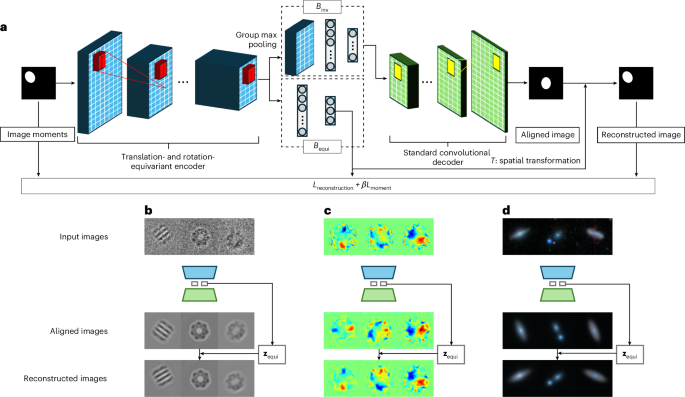Discovering fully semantic representations via centroid- and orientation-aware feature learning
IF 18.8
1区 计算机科学
Q1 COMPUTER SCIENCE, ARTIFICIAL INTELLIGENCE
引用次数: 0
Abstract
Learning meaningful representations of images in scientific domains that are robust to variations in centroids and orientations remains an important challenge. Here we introduce centroid- and orientation-aware disentangling autoencoder (CODAE), an encoder–decoder-based neural network that learns meaningful content of objects in a latent space. Specifically, a combination of a translation- and rotation-equivariant encoder, Euler encoding and an image moment loss enables CODAE to extract features invariant to positions and orientations of objects of interest from randomly translated and rotated images. We evaluate this approach on several publicly available scientific datasets, including protein images from life sciences, four-dimensional scanning transmission electron microscopy data from material science and galaxy images from astronomy. The evaluation shows that CODAE learns centroids, orientations and their invariant features and outputs, as well as aligned reconstructions and the exact view reconstructions of the input images with high quality. Cha and colleagues present a translation- and rotation-equivariant autoencoder-based method for robust image recognition, which they demonstrate on diverse tasks from bioinformatics, material science and astronomy.


通过质心和方向感知特征学习发现完全语义表示
在科学领域中学习有意义的图像表征,使其对中心点和方向的变化具有鲁棒性,仍然是一项重要的挑战。在此,我们介绍了中心点和方向感知解离自动编码器(CODAE),这是一种基于编码器-解码器的神经网络,可学习潜在空间中物体的有意义内容。具体来说,结合平移和旋转等价编码器、欧拉编码和图像力矩损失,CODAE 能够从随机平移和旋转的图像中提取与感兴趣对象的位置和方向无关的特征。我们在几个公开的科学数据集上对这种方法进行了评估,包括生命科学中的蛋白质图像、材料科学中的四维扫描透射电子显微镜数据和天文学中的星系图像。评估结果表明,CODAE 能学习输入图像的中心点、方向及其不变特征和输出,以及高质量的对齐重建和精确视图重建。
本文章由计算机程序翻译,如有差异,请以英文原文为准。
求助全文
约1分钟内获得全文
求助全文
来源期刊

Nature Machine Intelligence
Multiple-
CiteScore
36.90
自引率
2.10%
发文量
127
期刊介绍:
Nature Machine Intelligence is a distinguished publication that presents original research and reviews on various topics in machine learning, robotics, and AI. Our focus extends beyond these fields, exploring their profound impact on other scientific disciplines, as well as societal and industrial aspects. We recognize limitless possibilities wherein machine intelligence can augment human capabilities and knowledge in domains like scientific exploration, healthcare, medical diagnostics, and the creation of safe and sustainable cities, transportation, and agriculture. Simultaneously, we acknowledge the emergence of ethical, social, and legal concerns due to the rapid pace of advancements.
To foster interdisciplinary discussions on these far-reaching implications, Nature Machine Intelligence serves as a platform for dialogue facilitated through Comments, News Features, News & Views articles, and Correspondence. Our goal is to encourage a comprehensive examination of these subjects.
Similar to all Nature-branded journals, Nature Machine Intelligence operates under the guidance of a team of skilled editors. We adhere to a fair and rigorous peer-review process, ensuring high standards of copy-editing and production, swift publication, and editorial independence.
 求助内容:
求助内容: 应助结果提醒方式:
应助结果提醒方式:


